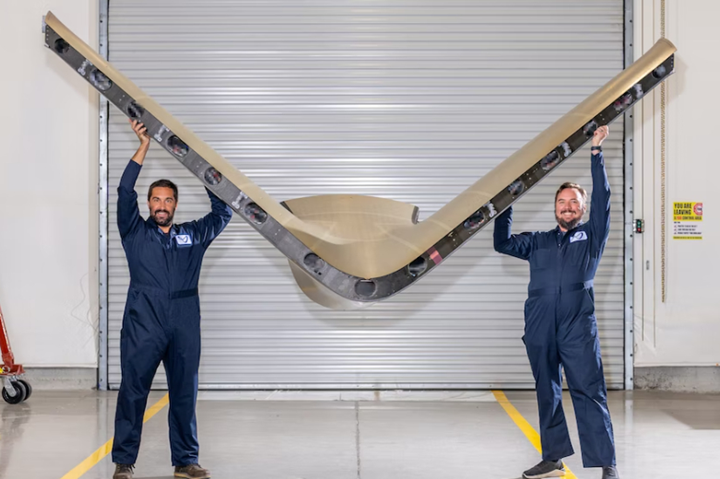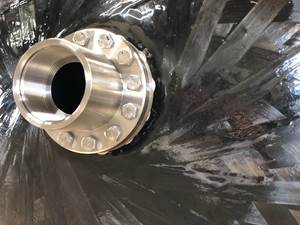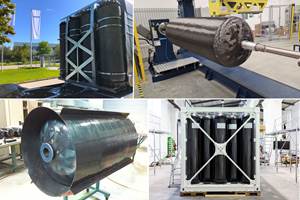Joby Aviation maintains momentum with eVTOL certification, operational and manufacturing readiness
In its Letter to Shareholders, Joby announces its agreement with the FAA on a revised eVTOL certification basis, its application for U.K. type certification validation, cites new developments with the U.S. DOD and more.

Joby has completed the tail section of its first production-intent aircraft, and says assembly of the wing and fuselage are well underway. Photo Credit: Joby Aviation
Joby Aviation’s (Santa Cruz, Calif., U.S.) announced that it has signed a revised G-1 certification basis for its composites-intensive tiltprop S4 with the Federal Aviation Administration (FAA). This comes after the FAA changed direction with certifying electric vertical takeoff and landing (eVTOL) aircraft, switching from Part 23 small airplane category to Part 21.17b special class “powered lift” category. The company is still on track to launch air taxi operations in 2024.
“This is a great opportunity for us because what we also were able to do was to bring in some potential other regulations that we’re expecting already through special conditions,” Didier Papadopoulos, Joby head of aircraft OEM, told Q2 results call with analysts. “We brought those in and included them already in the G-1.”
According to Aviation Week, Papadopoulos says with special conditions included in the G-1, the scope of certification is clearer. “We have a clear understanding of the regulations that will apply to us and we have a clear path to move forward,” he says. The FAA so far has approved 74% of the means of compliance and 37% of the area-specific certification plans submitted by Joby, he added.
Earlier in July the company formally applied for concurrent validation of its FAA type certification (TC) in the U.K., its first foreign validation. The U.K. Civil Aviation Authority (CAA) has agreed to accept Part 21.17b certification, JoeBen Bevirt, Joby founder and CEO, says, while also using the European Union Aviation Safety Agency’s (EASA) Special Condition for VTOL to certify U.K.-developed eVTOL aircraft.
Meanwhile, Joby has completed the tail section of its next, partially conforming “production-intent” prototype, and assembly of the wing and fuselage are underway at the company’s pilot production facility in Marina, Calif., U.S.. Aviation Week reports that internal acceptance testing has begun on the majority of powertrain and electronics assemblies for this aircraft —including “design-intent” electric propulsion units, battery modules and mission display computers produced in-house by Joby.
In addition, with the U.S. Department of Energy’s (DOD’s) National Renewable Energy Laboratory, Joby has completed what it believes to be the first life cycle assessment (LCA) of an eVTOL aircraft’s environmental footprint, including manufacturing, operations and disposal or redeployment. Bevirt says that “initial results are very positive,” expecting Joby’s aircraft to have a lower environmental footprint than the majority of other existing modes of transport and “a comparable or smaller climate footprint than electric vehicles, assuming both are charged with renewable energy.”
After completing their useful life on aircraft, battery cells will be reused in energy storage systems across Joby’s Skyport Network of vertiports; after their second life, they will be recycled back into the battery supply chain by Redwood Materials (Carson City, Nev., U.S.). Joby says it has built similar principles into its airframe manufacturing processes using automation and additive techniques. “We’re working with third parties to recycle excess titanium, aluminum and carbon fiber,” Bevirt says. Carbon Conversions (Lake City, S.C., U.S.) will recycle scrap fiber.
According to Joby’s recent financial results, the company ended Q2 with less than $1.2 billion in cash, having spent $74.2 million on research and development (R&D). Recognizing increased volatility in financial markets, the company has slowed planned spending and prioritized certification, early manufacture and initial operations.
While total R&D spend for the first half was $146.3 million, well up from $88.2 million for the same period in 2021, Joby now expects net cash burn for the full year to be $320-340 million compared with its previous guidance of $340-360 million for 2022.
“This year has really been around ramping up our engineering team and hitting our certification deliverables,” Matthew Field, chief financial officer (CFO), told analysts. “We’ve been ramping up early production in manufacturing.”
Looking ahead, Field says spending is expected to increase as Joby ramps up production rate and the resources required to support air taxi operations as well as support expanded contracts with the U.S. DOD.
Content originally sourced from Aviation Week and Joby Aviation newsroom.
Related Content
Composites opportunities in eVTOLs
As eVTOL OEMs seek to advance program certification, production scale-up and lightweighting, AAM’s penetration into the composites market is moving on an upward trajectory.
Read MoreLilium launches M&A process, targets eVTOL program continuation
Despite court-approved insolvency filings and beginning first investor briefings, Lilium remains fully focused on re-emerging following restructuring, setting its sights on fresh investment to support the Lilium Jet.
Read MoreInfinite Composites: Type V tanks for space, hydrogen, automotive and more
After a decade of proving its linerless, weight-saving composite tanks with NASA and more than 30 aerospace companies, this CryoSphere pioneer is scaling for growth in commercial space and sustainable transportation on Earth.
Read MoreComposites end markets: Pressure vessels (2024)
The market for pressure vessels used to store zero-emission fuels is rapidly growing, with ongoing developments and commercialization of Type 3, 4 and 5 tanks.
Read MoreRead Next
VIDEO: High-volume processing for fiberglass components
Cannon Ergos, a company specializing in high-ton presses and equipment for composites fabrication and plastics processing, displayed automotive and industrial components at CAMX 2024.
Read MoreDeveloping bonded composite repair for ships, offshore units
Bureau Veritas and industry partners issue guidelines and pave the way for certification via StrengthBond Offshore project.
Read MoreAll-recycled, needle-punched nonwoven CFRP slashes carbon footprint of Formula 2 seat
Dallara and Tenowo collaborate to produce a race-ready Formula 2 seat using recycled carbon fiber, reducing CO2 emissions by 97.5% compared to virgin materials.
Read More


























